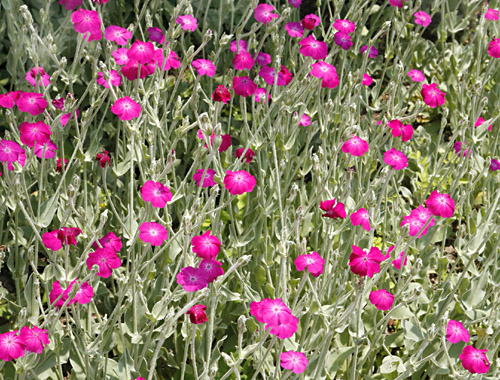This is a really lovely plant for anyone who wants bold color. It's really easy to grow and takes very little maintenance, it's very drought resistant and will grow almost anywhere even in gravel! If that’s not enough deer don't eat it!
The leaves of rose campion are silvery gray in color with a soft woolly texture that can be mistaken for lambs ears. The leaves are evergreen bringing interest and light to a winter garden. In spring the plant sends up a long flower stems often reaching 2-3 feet in height and produces a profusion of bright magenta flowers. Each flower lasts only a day but there are some many of them over a long blooming period that the flowers seem to go on forever. It makes a wonderful backdrop for any garden, placed before shrubs or trees it will lighten any area and give it a wonderful ‘cottage garden’ feel without any of the work.
The plant is a short lived perennial. Most commonly it will create a rosette of silver leaves in the first year and flower in the second but sometimes it will flower in it's first year although not as profusely. For the second and third year it will produce a multitude of blooms. After the third year the plants usually die but it will reseed itself freely so more plants will always be available to perpetuate the lovely flowers.
This is a truly lovely plant for anyone who wants bold color in the garden but does not want to do much work to get it.
Culture.
Rose campion loves poor dry soils, it seems to do better there than in richer loamy soils. It will seed itself and grow on gravel even gravel driveways given a chance. It needs no water and can survive long periods of drought although flowering will be reduced or inhibited without some watering. It likes full sun but will do reasonably in some light shade, in hot climates it prefers a little afternoon shade. It is hardy to Zone 4, some claims are made for Zone 3 but it may not survive winters, it will however reseed.
Despite claims that it only does well on alkaline soils it will grow well in mildly acid ones we have tested it up to 5.3 and it's still blooms profusely without any intervention or additional water. It is a truly hardy plant giving wonderful color for little or now water and really no care at all. The only thing that really needs to be done is cutting down the long flower heads after the seeds have fallen to ‘tidy up’ the garden for the next spring.
Propagation:
Sow seeds in place in autumn or a few weeks before the last expected frost in spring. Seeds need to be chilled before they germinate - our seeds are prechilled before they are sold. Clear a section of ground where you want the plants to grow and sprinkle the seeds. Mixing the seeds with sand or fine peat moss first allows for a more even distribution of the seeds. Do not cover they need light to germinate. If desired seedlings can be thinned or transplanted when they are large enough. Water transplants well for several weeks after transplanting as plants do not like to be moved. They will reestablish themselves in dry areas but additional water is needed until they are settled. Can start indoors in trays about 6-8 weeks prior to last spring frost. Scatter seeds on the tray do not cover. Keep trays warm as the seeds need warm soil to germinate.
Rose campion can also come with white flowers. If you have a white flowered variety ensure that the magenta ones are well separated from them as the white variety seems to have much stronger genetic material and will take over the magenta ones if they are planted too close to one another.
If planting in gravel ensure you are using an older more established gravel not newly pre-washed. Although rose campions will grow in gravel it does need some organic material mixed in to allow the roots to flourish. Most often this cannot be seen from the surface but will be noticed if the gravel is dug up.
Sunlight:








